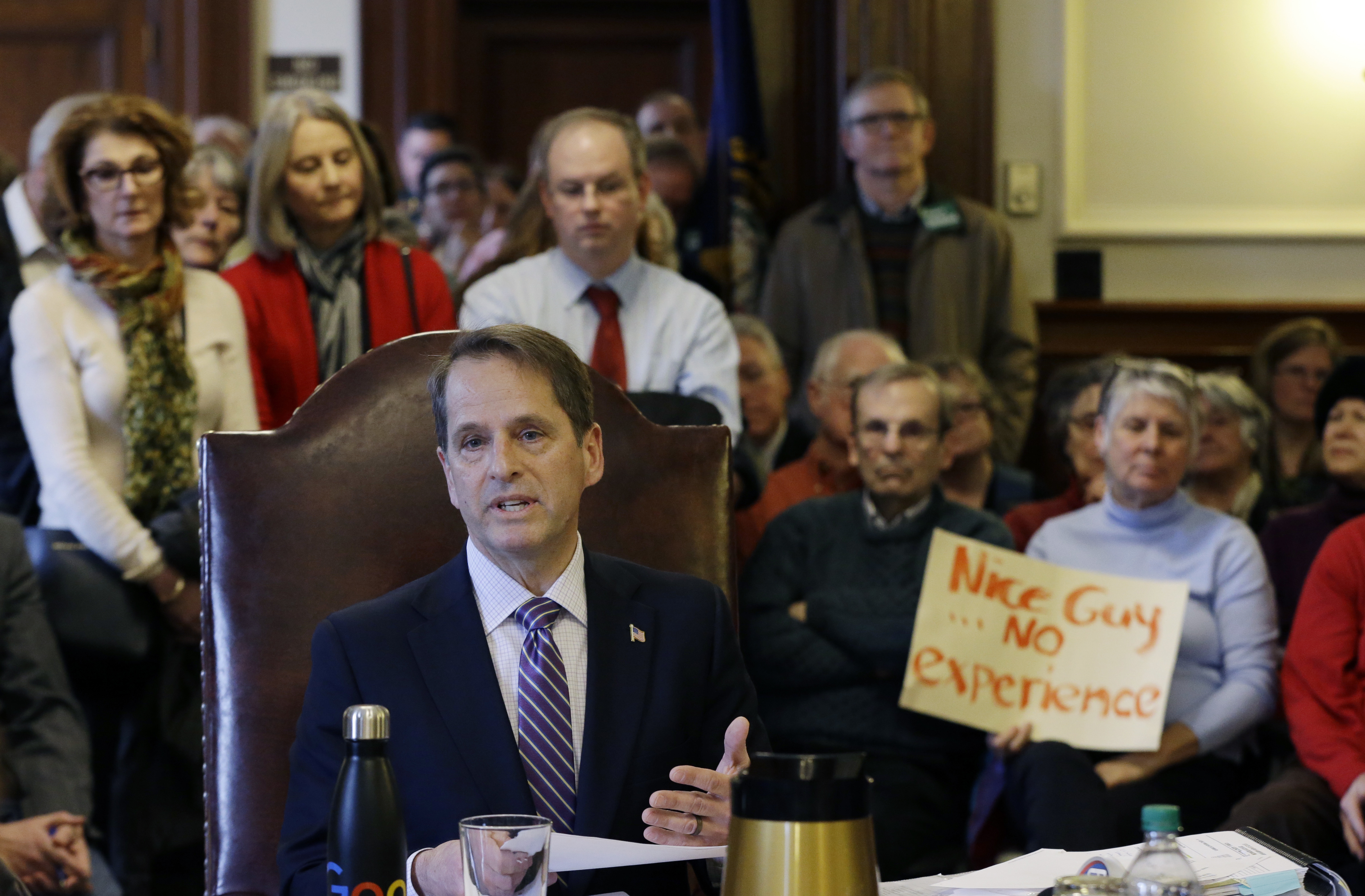Public School Advocates Concerned About GOP Amendment Seeking to Shift Power to Education Commissioner

A proposed draft amendment for an education bill would dramatically shake up the state Department of Education and shift some power and authority to the state education commissioner. Yet, the senator who introduced it said it simply “allows managers to manage their department.”
Frank Edelblut, the new commissioner who previously lost the Republican gubernatorial bid to Chris Sununu in the 2016 election, is already a controversial figure within Sununu’s administration for his pro-school choice views, and this amendment isn’t sitting well with public school advocates.
The amendment, drafted by Sen. John Reagan, R-Deerfield, was first posted Wednesday by Reaching Higher NH, an organization supporting high standards in public schools.
Reagan said the bill came at the request of Edelblut and it “permits the commissioner to make some managerial changes.” He said he doesn’t understand where the backlash on the amendment is coming from.
“He should be able to do what he wants to do,” Reagan told NH Journal. “They [public school advocates] don’t like anything that disturbs their monopoly of state dollars. They see something and try to discredit Republican management of government. You should be able to let your managers manage your business.”
Among the proposed changes, Reagan is proposing to eliminate four existing divisions in the state Department of Education (DOE) and replacing them with four new divisions under the direction of the commissioner, and giving the commissioner authority over several programs, funds, and personnel.
The proposal is poised to be an amendment to House Bill 356. Reagan said he talked to Rep. Rick Ladd, R-Haverhill, who is the author of HB356 and Ladd gave him the go-ahead to attach the amendment to his bill.
Public school advocates are concerned that the amendment “introduces greater volatility and uncertainty around how we hold N.H. schools and districts accountable for delivering an adequate education to our children.”
This is NOT how we do it. NH friends, spread the word; @ChrisSununu & @Edelblut4NH stage a power grab. @AndruVolinsky @WatchYourRepsNH
— Sherry Frost (@frostnhstaterep) April 13, 2017
Reaching Higher NH says the amendment would make it easier for public funds to go towards schools or education offerings that are not subject to the same rigorous public oversight as public schools.
“The amendment would grant the Commissioner of Education expansive authority that exceeds the discretion provided to most other state departments,” the organization wrote in a blog post about the amendment.
In New Hampshire, the state education commissioner is largely seen as the face of the DOE, simply carrying out policy that the state Board of Education introduces.
“The Department of Education, consistent with New Hampshire’s local control ethos, has historically served primarily as the provider of state education funding and as the intermediary between local school districts and the federal Department of Education,” the post stated. “In these roles, the Department provides much needed expertise and serves as an important guardian of students’ rights to a public education.”
The amendment calls for eliminating four divisions, including the Division of Educational Improvement, Division of Program Support, Division of Career Technology and Adult Learning, and Division of Higher Education within the DOE and replacing them with four new divisions, which have not yet been determined, all under the direction of the education commissioner.
Yet, Reagan said he believes the bill means the divisions will just be retitled, “making it easier for the head manager to move managers around. It’s what any organization should be allowed to do.”
Advocates say the amendment would remove an institutional check that exists to prevent the DOE and New Hampshire public education from becoming overly-politicized.
For example, the Division of Educational Improvement currently has the responsibility to “determine if a district is making diligent efforts to resolve personnel shortages that result in children with disabilities being placed out of district.” The amendment would transfer that power to Edelblut.
Reaching Higher NH also said the elimination of the divisions and allowing the commissioner to create new ones allows for a standard of appointing division directors that could lead to nominees who do not have the education or experience to lead those offices.
That was a significant criticism for Edelblut as education commissioner since he does not come from an education background (his children have also been homeschooled), yet he was tapped to lead the department anyway.
“By eliminating the specific responsibilities of the directors, the amendment lowers the standard for appointing directors — the governor and Executive Council will no longer be able to assess whether the Commissioner’s nominees have the education and experience necessary to serve New Hampshire’s kids and families,” the organization wrote.
Advocates are also concerned with the new amendment in terms of financial accountability and how public funds are used within the DOE. The amendment allows the education commissioner to move funds within the department at any time without approval if it’s under $75,000. That means Edelblut can transfer funds allocated for a specific purpose and reallocate them for something else.
“Transfer funds…as the commissioner deems necessary and appropriate to address present or projected budget deficits, or to respond to changes in federal laws, regulations, or programs, and otherwise as necessary for the efficient management of the department…,” the amendment states.
Reagan said the measure was intended to ensure the education commissioner could move funds where there is a need in the department.
“It’s for small amounts, like allowing office managers to use the funds for pencils to instead be used for toners,” he said.
The Legislature’s finance committees, the governor, and Executive Council still must approve transfers of $75,000 or more, but Reagan said they shouldn’t be “controlling” the department at “that level of detail.”
HB 356 has already gone through some changes before it was introduced to the Senate Education Committee on March 23. When it was first introduced in January by Ladd, it would simply tweak the base adequacy funding amount — the amount the state gives to a district per pupil — from $3,561.27 to $3,591.27, only a $30 increase.
He told the House Education Committee that he wanted to use the legislation as a starting point to eventually form a joint committee with the House and Senate to work on a new formula for the next year in time for the next biennium. The committee voted in favor of his amendment, essentially changing the bill establishing a committee to study education funding and the cost of an opportunity for an adequate education, and the House eventually passed the bill at the end of March.
The Senate Education Committee is expected to act on the legislation this month. Reagan’s amendment has not been formally introduced to the committee yet, but a public hearing on the bill has already happened before this amendment was known to members of the public. Advocates are calling to have another public hearing to discuss the amendment.
NH Journal reached out to Edelblut for comment and will update the story with a response.
Sign up for NH Journal’s must-read morning political newsletter.





